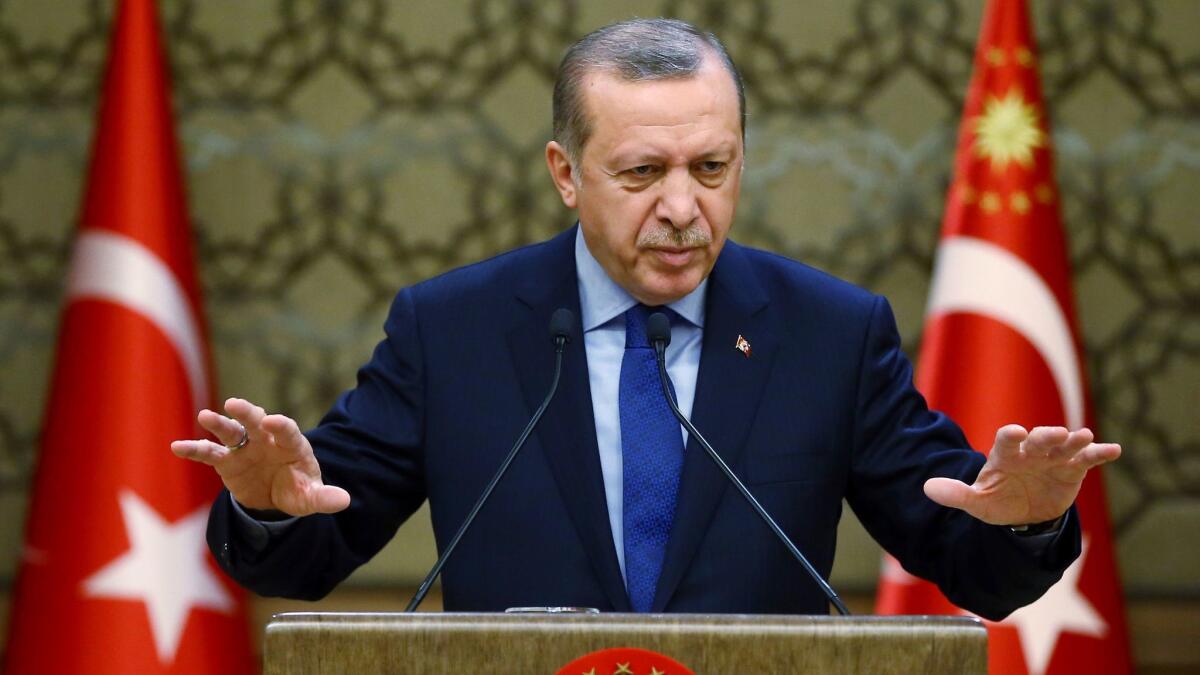Turkey’s ruling party moves to tighten Erdogan’s grip on power

Turkish President Recep Tayyip Erdogan addresses local administrators in Ankara, the capital, on Dec. 7, 2016.
- Share via
Reporting from ISTANBUL, Turkey — Turkey’s ruling party on Saturday proposed constitutional changes that would substantially increase presidential power, a move that comes months after a failed coup.
The proposal, introduced by the party of President Recep Tayyip Erdogan, came the same day two bombs exploded outside a soccer stadium in Istanbul, killing 29 people and wounding at least 166.
One blast was apparently caused by a suicide bomber, while the second was produced by a car bomb, the Associated Press reported.
No one had claimed responsibility for the late-night attacks, and it was unclear whether they were related to the constitutional changes proposed by Erdogan’s ruling Justice and Development Party. Turkey has been targeted by Kurdish militants and by the group Islamic State.
In explaining the proposal unveiled Saturday, Erdogan aides say the presidency is modeled after those of the United States and France, but there will be no prime minister, unlike in France, nor the equivalent of a congressional branch of government.
The president would initiate the budget, name all ministers and rule by decree, while the parliament’s role would be to approve the decrees, or call for new elections if it can muster a two-thirds majority.
If the proposed reforms are approved by parliament, Turks would vote in a referendum to determine whether to adopt the new system of government.
Erdogan needs the backing of 330 deputies in the 550-seat assembly to initiate a national referendum, and he’s expected to be able to do that with the help of his own absolute majority of 316 members from the Justice and Development Party, bolstered by the 39 members of the Nationalist Movement party.
The state-run Anadolu news agency said the proposed constitutional amendment would be reviewed by the four political parties and the government over two parliamentary sessions.
Prime Minister Binali Yildirim told reporters that each article would be voted on separately and would require 330 votes for approval, then the entire bill would be voted on. A referendum would take place 60 days after the parliamentary process is completed.
If approved, the constitutional reforms would take effect in 2019, and it’s conceivable that after nearly 14 years in power, Erdogan could qualify for two more five-year terms, allowing him to remain in office through 2029.
In addition to the coup attempt July 15, the country has experienced a struggling economy and several bombings and is concerned with fighting Kurdish militants in the southeast and Islamic State in neighboring Syria.
The leader of the main opposition party in parliament compared the reform proposal to the political systems of Nazi Germany and North Korea.
“Is it right to give all the power to one person? ‘I am the state’ is the motto of Hitler,” Kemal Kilicdaroglu of the Republican People’s Party said in an interview.
He said Turkey had almost turned into a North Korea, “isolated from the civilized world.”
Turkey is in the fifth month of a state of emergency, after the failed coup apparently staged by military supporters of Fethullah Gulen, an Islamic cleric living in self-exile in the United States.
The coup attempt was followed by a large-scale purge involving the suspensions or dismissals of tens of thousands of bureaucrats, teachers, soldiers and others who were considered suspect.
The Cumhuriyet, an opposition daily, has seen its editor in chief and 10 journalists jailed on charges of “acting on behalf of a terror organization without being a member,” a reference to the Gulen movement.
The crackdown provoked a stinging rebuke Friday from the Organization for Security and Cooperation in Europe.
“It is unacceptable that in the 21st century … to suddenly have the terrifying situation where people are scared to express their views,” said Dunja Mijatovic, the OSCE representative on freedom of the media.
Gutman is a special correspondent. Special correspondent Duygu Guvenc in Ankara contributed to this report.
ALSO
Pentagon will send 200 more troops to Syria
In the battle for control of key oil installations in Libya, a military man takes center stage
Islamic State video of captured British photographer signals a shift in the group’s propaganda
UPDATES:
7:30 p.m.: This article was updated to include the bombings in Istanbul.
It was first published at 5:10 p.m.
More to Read
Sign up for Essential California
The most important California stories and recommendations in your inbox every morning.
You may occasionally receive promotional content from the Los Angeles Times.












